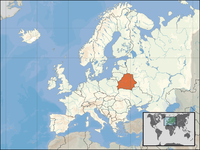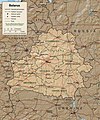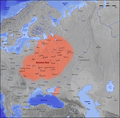Portal:Belarus
| Welcome to Belarus Portal
|
Сардэчна запрашаем да беларускага партала!
 |
 |

| |
Belarus, officially the Republic of Belarus, is a landlocked country in Eastern Europe. It is bordered by Russia to the east and northeast, Ukraine to the south, Poland to the west, and Lithuania and Latvia to the northwest. Belarus spans an area of 207,600 square kilometres (80,200 sq mi) with a population of 9.1 million. The country has a hemiboreal climate and is administratively divided into six regions. Minsk is the capital and largest city; it is administered separately as a city with special status.
Between the medieval period and the 20th century, different states at various times controlled the lands of modern-day Belarus, including Kievan Rus', the Principality of Polotsk, the Grand Duchy of Lithuania, the Polish–Lithuanian Commonwealth, and the Russian Empire. In the aftermath of the Russian Revolution in 1917, different states arose competing for legitimacy amid the Civil War, ultimately ending in the rise of the Byelorussian SSR, which became a founding constituent republic of the Soviet Union in 1922. After the Polish-Soviet War (1918–1921), Belarus lost almost half of its territory to Poland. Much of the borders of Belarus took their modern shape in 1939, when some lands of the Second Polish Republic were reintegrated into it after the Soviet invasion of Poland, and were finalized after World War II. During World War II, military operations devastated Belarus, which lost about a quarter of its population and half of its economic resources. In 1945, the Byelorussian SSR became a founding member of the United Nations and the Soviet Union. The republic was home to a widespread and diverse anti-Nazi insurgent movement which dominated politics until well into the 1970s, overseeing Belarus' transformation from an agrarian to an industrial economy.
The parliament of the republic proclaimed the sovereignty of Belarus on 27 July 1990, and during the dissolution of the Soviet Union, Belarus gained independence on 25 August 1991. Following the adoption of a new constitution in 1994, Alexander Lukashenko was elected Belarus's first president in the country's first and only free election after independence, serving as president ever since. Lukashenko heads a highly centralized authoritarian government. Belarus ranks low in international measurements of freedom of the press and civil liberties. It has continued several Soviet-era policies, such as state ownership of large sections of the economy. Belarus is the only European country that continues to use capital punishment. In 2000, Belarus and Russia signed a treaty for greater cooperation, forming the Union State. (Full article...)
Selected article
Andrzej Tadeusz Bonawentura Kościuszko (English: Andrew Thaddeus Bonaventure Kosciuszko; 4 or 12 February 1746 – 15 October 1817) was a Polish military engineer, statesman, and military leader who then became a national hero in Poland, the United States, Lithuania, and Belarus. He fought in the Polish–Lithuanian Commonwealth's struggles against Russia and Prussia, and on the U.S. side in the American Revolutionary War. As Supreme Commander of the Polish National Armed Forces, he led the 1794 Kościuszko Uprising.
Kościuszko was born in February 1746, in a manor house on the Mereczowszczyzna estate in Brest Litovsk Voivodeship, then Grand Duchy of Lithuania, a part of the Polish–Lithuanian Commonwealth, now the Ivatsevichy District of Belarus. At age 20, he graduated from the Corps of Cadets in Warsaw, Poland. After the start of the civil war in 1768, Kościuszko moved to France in 1769 to study. He returned to the Commonwealth in 1774, two years after the First Partition, and was a tutor in Józef Sylwester Sosnowski's household. In 1776, Kościuszko moved to North America, where he took part in the American Revolutionary War as a colonel in the Continental Army. An accomplished military architect, he designed and oversaw the construction of state-of-the-art fortifications, including those at West Point, New York. In 1783, in recognition of his services, the Continental Congress promoted him to brigadier general. (Full article...)
Selected biography
Svetlana Alexandrovna Alexievich (born 31 May 1948) is a Belarusian investigative journalist, essayist and oral historian who writes in Russian. She was awarded the 2015 Nobel Prize in Literature "for her polyphonic writings, a monument to suffering and courage in our time". She is the first writer from Belarus to receive the award. (Full article...)
Selected picture
Related portals
Post Soviet states
Other countries
Did you know

- ...that the 17th century Biaroza monastery (pictured) in Biaroza, Belarus, has in its time been adapted into military barracks and a prison, and currently its ruins are an important baroque relic in the town?
General images
Topics
Subcategories
Featured articles
New article announcements
This page was created using Portal:Belarus/New article announcements. It is created for everyone interested in Belarus-related articles to notice everything new.
Urgent announcements
- NONE
This list was generated from these rules. Questions and feedback are always welcome! The search is being run daily with the most recent ~14 days of results. Note: Some articles may not be relevant to this project.
Rules | Match log | Results page (for watching) | Last updated: 2024-11-14 19:46 (UTC)
Note: The list display can now be customized by each user. See List display personalization for details.
- Konstantin Pavlovich, Grand Duke of Russia (edit | talk | history | links | watch | logs | tools) by Artemis Andromeda (talk · contribs · new pages (29)) started on 2024-11-14, score: 30
- Testovskaya (Moskva-City) railway station (edit | talk | history | links | watch | logs | tools) by 162 etc. (talk · contribs · new pages (41)) started on 2024-11-13, score: 20
- Battle of Vilnius (1812) (edit | talk | history | links | watch | logs | tools) by KeyMen12 (talk · contribs · new pages (2)) started on 2024-11-08, score: 20
- Belarus-2 (edit | talk | history | links | watch | logs | tools) by RandomMe98 (talk · contribs · new pages (21)) started on 2024-11-13, score: 40
- Uładzimier Samojła (edit | talk | history | links | watch | logs | tools) by SuuriMara (talk · contribs · new pages (1)) started on 2024-11-11, score: 60
- Der Avangard (edit | talk | history | links | watch | logs | tools) by Soman (talk · contribs · new pages (21)) started on 2024-11-11, score: 40
- 25th Tank Division (Soviet Union) (edit | talk | history | links | watch | logs | tools) by Buckshot06 (talk · contribs · new pages (2)) started on 2024-11-11, score: 30
- Jazep (edit | talk | history | links | watch | logs | tools) by Duckmather (talk · contribs · new pages (48)) started on 2024-11-10, score: 20
- Bujnicki (edit | talk | history | links | watch | logs | tools) by Duckmather (talk · contribs · new pages (48)) started on 2024-11-10, score: 20
- Jewish refugees from Nazism (edit | talk | history | links | watch | logs | tools) by Boxes12 (talk · contribs · new pages (7)) started on 2024-11-10, score: 30
- Turov, Belarus (edit | talk | history | links | watch | logs | tools) by Bkonrad (talk · contribs · new pages (9)) started on 2024-11-07, score: 50
- Stanisław Kazimierz Kossakowski (edit | talk | history | links | watch | logs | tools) by Marcelus (talk · contribs · new pages (11)) started on 2024-11-07, score: 30
- Paulette Brupbacher (edit | talk | history | links | watch | logs | tools) by Asilvering (talk · contribs · new pages (47)) started on 2024-11-07, score: 20
- International reactions to the 2024 United States presidential election (edit | talk | history | links | watch | logs | tools) by Noble Attempt (talk · contribs · new pages (8)) started on 2024-11-06, score: 20
- The Brothers Karamazov (2009 TV series) (edit | talk | history | links | watch | logs | tools) by Er nesto (talk · contribs · new pages (10)) started on 2024-11-05, score: 20
- Oleg Pryimachov (edit | talk | history | links | watch | logs | tools) by Khonda8 (talk · contribs · new pages (4)) started on 2024-11-05, score: 20
- House of Bordziłowski (edit | talk | history | links | watch | logs | tools) by Juliusmborris (talk · contribs · new pages (1)) started on 2024-11-04, score: 40
- Eleutherius Bogoyavlensky (edit | talk | history | links | watch | logs | tools) by Oliwiasocz (talk · contribs · new pages (19)) started on 2024-11-04, score: 20
- Sovetskaya Belorussiya (Telegram Channel) (edit | talk | history | links | watch | logs | tools) by MocnyDuham (talk · contribs · new pages (1)) started on 2024-11-04, score: 40
- Individual Neutral Athletes at the 2025 World Games (edit | talk | history | links | watch | logs | tools) by Fjkcs (talk · contribs · new pages (2)) started on 2024-11-03, score: 20
- Samuel Norton Tomkin (edit | talk | history | links | watch | logs | tools) by Teatreez (talk · contribs · new pages (6)) started on 2024-11-03, score: 20
- 2024–25 Hofstra Pride men's basketball team (edit | talk | history | links | watch | logs | tools) by RedSox39 (talk · contribs · new pages (31)) started on 2024-11-01, score: 20
- Zai Sidibé (edit | talk | history | links | watch | logs | tools) by Martinm23forever (talk · contribs · new pages (10)) started on 2024-11-01, score: 50
- Aboltsy (edit | talk | history | links | watch | logs | tools) by Mellk (talk · contribs · new pages (36)) started on 2024-11-01, score: 60
- Danila Vergeychik (edit | talk | history | links | watch | logs | tools) by Martinm23forever (talk · contribs · new pages (10)) started on 2024-10-31, score: 60
- Arseniy Blotskiy (edit | talk | history | links | watch | logs | tools) by Martinm23forever (talk · contribs · new pages (10)) started on 2024-10-31, score: 60
- Aleksandr Shvedchikov (edit | talk | history | links | watch | logs | tools) by Martinm23forever (talk · contribs · new pages (10)) started on 2024-10-29, score: 70
- Maryna Kolb (edit | talk | history | links | watch | logs | tools) by Vecihi91 (talk · contribs · new pages (2)) started on 2024-10-26, score: 20
- Nadiia Kolb (edit | talk | history | links | watch | logs | tools) by Vecihi91 (talk · contribs · new pages (2)) started on 2024-10-26, score: 20
Associated Wikimedia
The following Wikimedia Foundation sister projects provide more on this subject:
-
Commons
Free media repository -
Wikibooks
Free textbooks and manuals -
Wikidata
Free knowledge base -
Wikinews
Free-content news -
Wikiquote
Collection of quotations -
Wikisource
Free-content library -
Wikiversity
Free learning tools -
Wikivoyage
Free travel guide -
Wiktionary
Dictionary and thesaurus
Sources
- ^ Kopka, D. (2011). Welcome to Belarus: Passport to Eastern Europe & Russia. Passport Series. Milliken Publishing Company. p. 6. ISBN 978-0-7877-2770-3. Retrieved July 28, 2019.
- ^ Harshav, Benjamin. Marc Chagall and his times: a documentary narrative. Contraversions: Jews and Other Differences. Stanford University Press; 1 edition. August 2003. ISBN 0804742146.











![Image 3The Fiddler, 1912–1913, by Marc Chagall, a Russian-French artist of Belarusian Jewish origin[2]](/media/wikipedia/en/thumb/4/4a/Image-Chagall_Fiddler.jpg/101px-Image-Chagall_Fiddler.jpg)
![Image 4White storks on their nest in Belarus, 2009. The Stork is the national symbol of Belarus.[1]](/media/wikipedia/commons/thumb/4/41/BY_stork1_2009.jpg/80px-BY_stork1_2009.jpg)
































































